Daily question: What might independence mean for Trident?
- Published
As the people of Scotland weigh up how to vote in the independence referendum, they are asking questions on a range of topics, from the economy to welfare.
In this series, we are looking at those major questions and by using statistics, analysis and expert views shining a light on some of the possible answers.
Here we look at how independence might affect Trident - the UK's nuclear weapons programme which is based in the River Clyde.
Do you have a referendum question? Let us know by...
Emailing newsonlinescotland@bbc.co.uk.
We can also be found on Twitter @bbcscotlandnews, external
And on Facebook, external.
BBC news website users have been sending in their questions about Trident, including Walter and Rita McCormick, John Anglim, Gerard Pigou, Dr Tim Rideout and Arthur Robertson.

What is Trident?
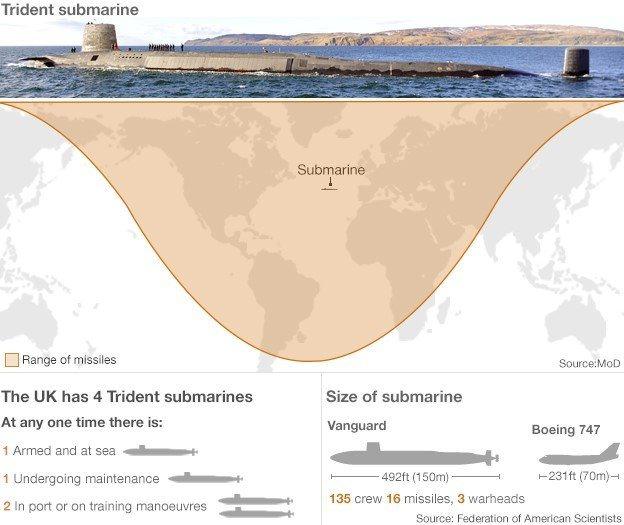
Britain is one of a handful of nations which has the ability to fight a nuclear war, and Trident is the name of its nuclear weapons programme.
The weapons are carried on four Vanguard-class submarines based at Her Majesty's Naval Base (HMNB) Clyde at Faslane in the Gare Loch, on the west coast of Scotland, about 25 miles outside Glasgow.
Spare warheads are stored eight miles away at the Royal Navy Armaments Depot at Coulport on Loch Long.

What's Trident for?
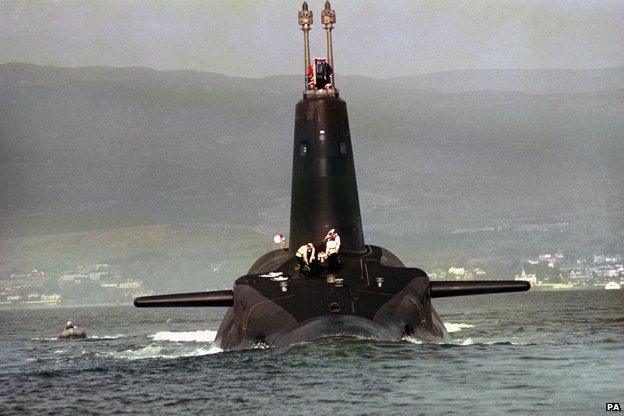
Since 1969, according to government documents, external, a British submarine carrying nuclear weapons has always been on patrol, gliding silently beneath the waves, somewhere in the world's oceans.
The logic is to deter a nuclear attack on the UK because, even if the nation's conventional defence capabilities were destroyed, the silent submarine would still be able to launch a catastrophic retaliatory strike on the aggressor, a concept known as mutually assured destruction.
The submarines carry up to 16 Trident missiles, external, each can be fitted with a number of warheads, which can be directed at up to 12 different targets.
Each of the four submarines carries a sealed "letter of last resort" in the prime minister's hand, containing instructions to follow, external if the UK has been devastated by a nuclear strike and the government annihilated.
Trident is reported to have a potential destructive power eight times that of the first atomic bomb, external, which is estimated to have killed 140,000 people, and to have maimed many more, when it was dropped by the United States on Hiroshima in Japan on 6 August, 1945.

So what's it got to do with the referendum?
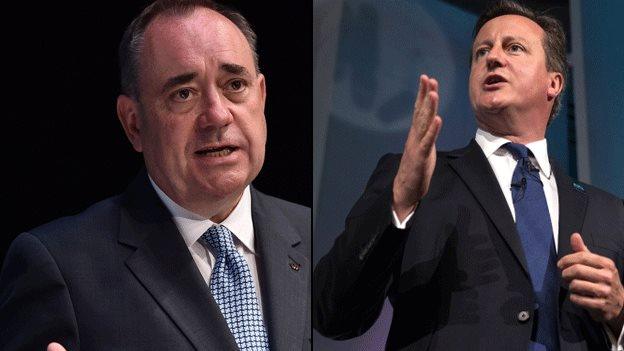
The submarines' lifespan is coming to an end with their retirement planned for the late 2020s and the missiles in the early 2040s.
In 2007 the House of Commons voted in favour, external of replacing it. Work has begun on designing the next generation of submarines but a final decision on the exact nature of the replacement has been deferred until 2016, after the next general election, not least because the present coalition government disagrees on how to proceed.
All three of the main UK parties favour maintaining nuclear weapons but Labour and the Conservatives want a like-for-like replacement for Trident while the Liberal Democrats have argued that three submarines, rather than four, would be sufficient.
However, the SNP-run Scottish government in Edinburgh has vowed that an independent Scotland would get rid of nuclear weapons, meaning that a "Yes" vote would cast doubt on the future of the Scotland-based weapons programme.

Why is the Scottish government against nuclear weapons?
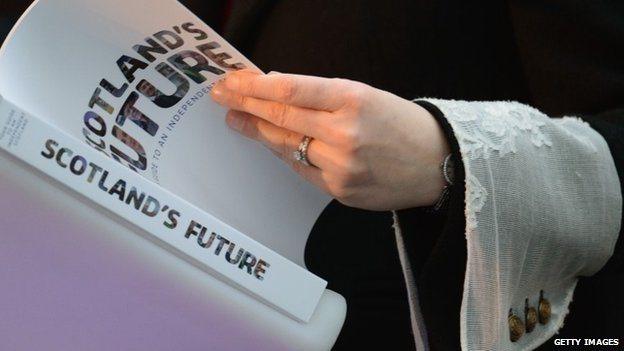
The Scottish government's prospectus for independence, Scotland's Future, external, makes the following case against Trident:
On moral and democratic grounds, Trident is "an affront to basic decency with its indiscriminate and inhumane destructive power" and "Scotland has been home to one of the largest concentrations of nuclear weapons anywhere in the world, despite consistent and clear opposition from across civic Scotland, our churches, trade unions and a clear majority of our elected politicians".
In economic terms, it says billions of pounds have already been wasted on "weapons that must never be used" and if there is a "No" vote "we risk wasting a further £100 billion" over the lifetime of the replacement system.
On defence grounds, it says "Westminster's commitment to nuclear weapons leaves other aspects of our defence weakened. Costs for the successor to Trident are to be met from within the defence budget, taking money from conventional equipment and levels of service personnel". Other critics complain that Trident was suited for the Cold War not for 21st century threats.
It concludes that "negotiations on the maintenance of shared capabilities [with rUK] would not include nuclear weapons. This Scottish government would make early agreement on the speediest safe removal of nuclear weapons a priority. This would be with a view to the removal of Trident within the first term of the Scottish Parliament following independence."

What would happen after a "Yes" vote?
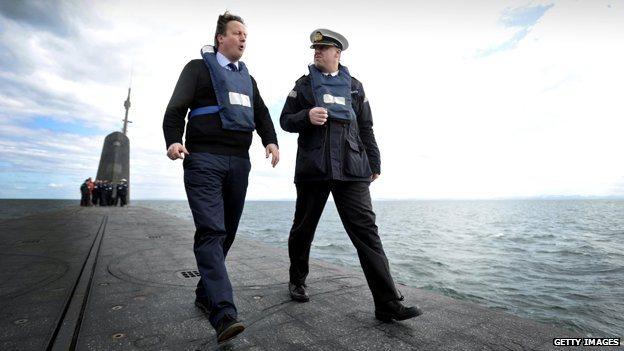
The "process and timetable" would be subject to negotiation with Westminster. The Royal United Services Institute (Rusi) said removing Trident would be very difficult, but "not impossible".
Its report also said, external relocating the submarines would be far cheaper than previously assumed. However, Rusi believed it could take a decade to build a base for the submarines elsewhere in the UK,
In an article for the Daily Telegraph, external in 2013, the Conservative prime minister David Cameron described Britain's nuclear weapons programme as "an insurance policy that the United Kingdom cannot do without" and insisted that a "credible and continuous independent nuclear deterrent remains a crucial component of our national security".
Given the difficulties associated with moving the nuclear programme from Faslane - covered extensively by BBC News - rather than dismantling it, it is possible that Scottish independence would have the practical effect of forcing the UK to give up sea-based nuclear weapons entirely.
In a paper, external for the Royal Institute of International Affairs, Andrew Dorman argues that such an outcome would "profoundly change the composition and functioning of the Security Council, significantly diminish rUK's standing, alter the balance of power in Europe and increase the shift of power from the North Atlantic to the Pacific".

What would happen to the Faslane base?
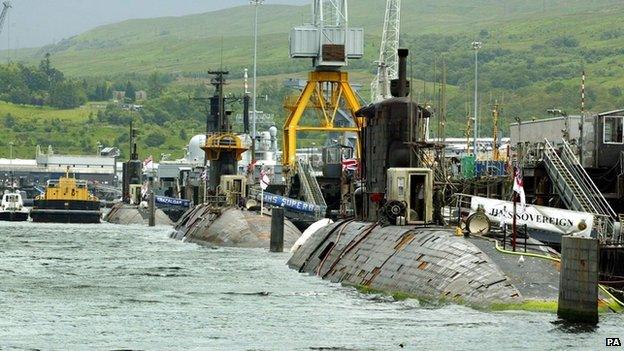
The Scottish government says it would transform HMNB Clyde at Faslane into Scotland's military headquarters and a conventional non-nuclear base for the Scottish navy.
Scotland's Future states that, after the transition from a British to a Scottish base, "the number of Scottish military personnel at Faslane will approximately match military numbers there currently...supported by a significant number of civilian personnel".
However, the Better Together campaign, which wants Scotland to remain in the UK, has claimed that thousands of jobs would be lost on the Clyde if there was a "Yes" vote.
It quotes the defence contractor Babcock as saying "it is unlikely that Clyde as a conventional naval base would require the same numbers of support personnel, particularly when the number of naval personnel will reduce significantly".

And what about if it's a "No" vote?
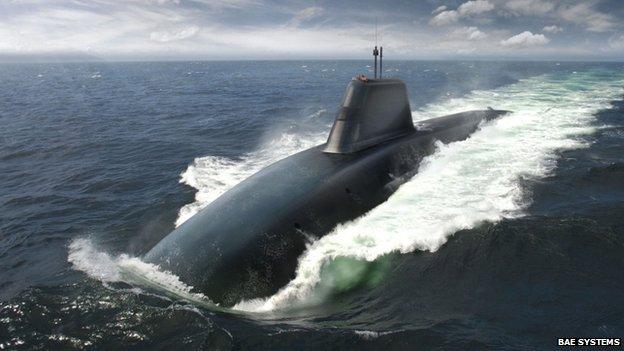
If Scotland votes "No", the UK government says all Royal Navy submarines will be based at Faslane by 2017.
These include the new Astute-class attack submarines as well as the older Trafalgar-class boats and the UK's submarine "centre of excellence".
The Ministry of Defence (MoD) says that military and associated civilian jobs will rise from 6,700 to 8,200 by 2022.
But, for a Scottish government which strongly opposes nuclear weapons, keeping Trident in Scotland is an option with little appeal.